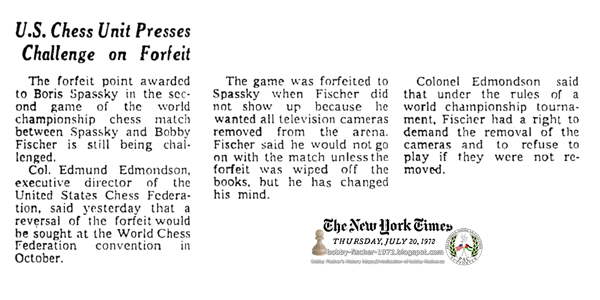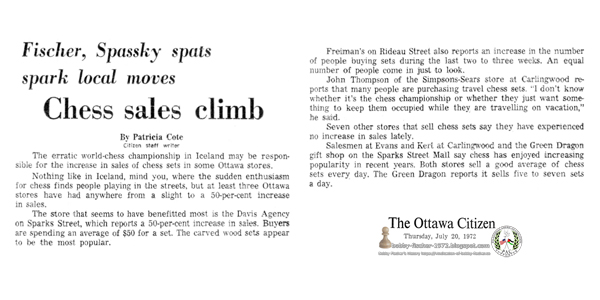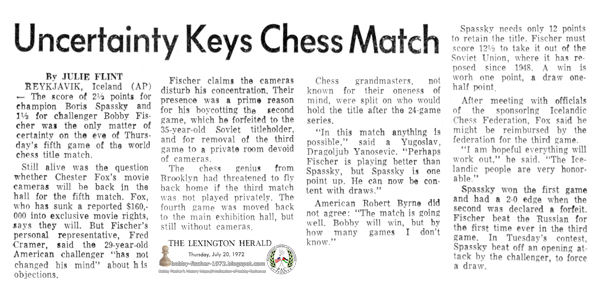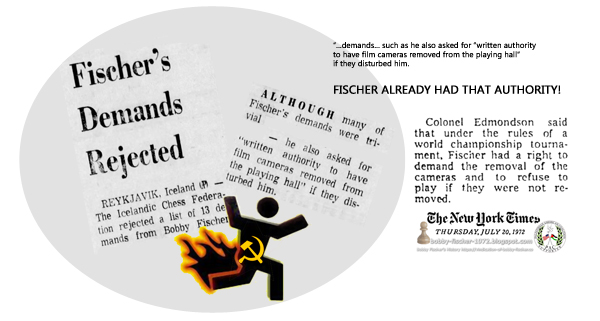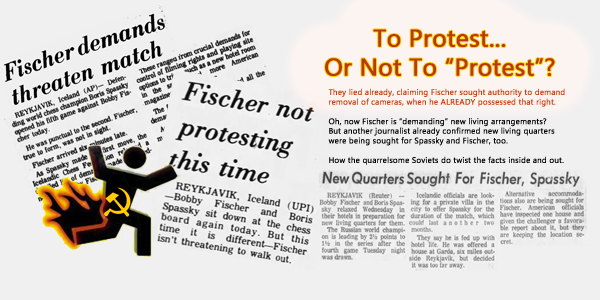New York Times, New York, New York, Thursday, July 20, 1972 - Page 30
Spassky and Fischer Play With Intense Drive to Win by Harold C. Schonberg
Reykjavik, Iceland, July 19 — As they say in poker, the players came to play.
Boris Spassky and Bobby Fischer have confronted each other over the board only three times in the world championship chess match, but it is clear that both the titleholder and the challenger are fighting for the points and are not likely to settle for “grandmaster draws.”
In a grandmaster draw, the players — perhaps tired, perhaps bored, perhaps wanting a day off, perhaps just throwing courage to the wind — play a dozen or so routine moves and, after an hour, agree to split the point.
Fischer, with his will to win, seldom offers or accepts a draw in any case. And Spassky, playing for the defense of his title, for his honor and what he considers the honor of the Soviet people, is in no mood to take the easy way out. ([Reported from an interview in 1985 with Boris Spassky, “Many observers thought Fischer's furor sapped (his, Spassky's]) concentration, but Spassky says the job was done by Moscow.”])
Fischer's refusal to play the second game because of the presence of ([disruptive crews of men, disruptively operating large, bulky]) television cameras in Exhibition Hall resulted in a forfeit to Spassky ([which the actual rules clearly stated Fischer was well within his right to protest, if the disruptive camera men became a distraction to either player, reserving right to demand their removal! Rules, which were flagrantly broken by organizers]). As a result, Spassky, who won the first game ([due to Fischer being distracted by disruptive camera men]) and lost the third, is leading by 2½ to 1½.
Yesterday's draw showed the keen rivalry. It was a brilliant and exciting game, far more than the game Fischer won from Spassky. In that game, Spassky was completely outplayed and never had much of a chance.
In last night's game, however, Spassky, playing the black pieces, sacrificed a pawn and launched an attack that had Fischer continually on the defensive.
In short, Spassky was not playing the defensive kind of game that the player of the black pieces usually adopts. Nor did Fischer play the usual kind of hold-the-line game in the third meeting. Playing black, he sprang a little-known move on the champion and then swarmed all over him when Spassky did not find the correct over-the-board solution.
In both cases, those moves were undoubtedly prepared variations. Chess players are continually searching for new lines.
Spassky spent seven months preparing for Fischer, undoubtedly aided by a phalanx of Soviet grandmasters.
There are about 90 grandmasters in the world, almost half of them in the Soviet Union and it is safe to assume that many worked with Spassky.
Fischer must have done the same, though he was unaided by any of the nine other grandmasters of his country. He prefers to work alone.
Thus when Spassky offered the pawn last night, or when Fischer in the third game let Spassky double his kingside pawn structure, those moves were not idle maneuvers but novelties that had been carefully plotted in advance.
It is difficult for a player to solve the problems posed by a complex and carefully prepared variation without running into time trouble. He has two and a half hours in which to make 40 moves, and he cannot afford to spend too many of those precious minutes on one move.
There will be many more of these surprise moves before the match is over. Spassky and Fischer known each other's style well, and undoubtedly are holding in abeyance unpleasant shocks for each other.
Even though chess openings have been exhaustively explored, chess remains a game of infinite possibilities, and a Spassky or a Fischer can and will come up with conceptions that nobody previously has explored. That is what has made them what they are.
They have more than memory and determination on their side. They also are creative, able to organize the 16 pieces at their disposal much as a Mozart could organize the 12 notes at his disposal—into personalized patterns of logic and beauty.
Styles Are Similar
Spassky's style is not too dissimilar from Fischer's, and that, too, adds to the interest of the match. For the last two of Fischer's opponents in the elimination matches had altogether different styles.
Bent Larsen of Denmark, who took a 6 to 0 beating from Fischer, is a chess-playing romantic—a gambler, a combination player, a go-for-broke attacker. His method of play could not penetrate Fischer's cool, precise, classic style.
Tigran Petrosian of the Soviet Union, on the other hand, is Larsen's antithesis. Petrosian is a careful and even timid player, with a vast knowledge of opening theory and technique. He plays for draws and minute advantages, but that did not work either. Fischer beat him, 6½ to 2½.
And now, as if to complete the circle, comes Spassky. The champion is a controlled player with elements of classicism in his style. Like Fischer, he can attack when he sees an opening, but normally—again like Fischer—he plays for positional advantage in a logical, clean-cut manner.
New York Times, New York, New York, Thursday, July 20, 1972 - Page 30
U.S. Chess Unit Presses Challenge on Forfeit
The forfeit point awarded to Boris Spassky in the second game of the world championship chess match between Spassky and Bobby Fischer is still being challenged.
Col. Edmund Edmondson, executive director of the United States Chess Federation, said yesterday that a reversal of the forfeit would be sought at the World Chess Federation convention in October.
The game was forfeited to Spassky when Fischer did not show up because he wanted all ([disruptive men hired to disruptively operate]) television cameras removed from the arena. Fischer said he would not go on with the match unless the forfeit was wiped off the books, but he has changed his mind. ([Not exactly changed his mind. The match was moved to an external room that contained automated closed-circuit cameras which Fischer never had objections to, and further, the aforementioned resolution was promised by the President of the USCF, Dubeck, to challenge the forfeit, if in the event that single point could adversely determine the outcome of the match.])
Colonel Edmondson said that under the rules of a world championship tournament, Fischer had a right to demand the removal of the cameras and to refuse to play if they were not removed.
Albuquerque Journal Albuquerque, New Mexico Thursday, July 20, 1972 - Page 5
The People's Column: Appreciates Chess Play
I WANTED to write to say how much I—and a lot of other people—appreciate the space you are giving the Spassky-Fischer chess match.
It is very easy for a paper to ignore something as special and esoteric as chess, especially with the Democratic Convention going on. We chess fans appreciate the Journal's care in running the wire-copy reports on the match regularly.
I especially appreciate the fact that you have not restricted your coverage to the sensational bickering and counter-bickering that went on BEFORE the match, but that you are also reporting the day-to-day match itself—including running the games.
It is extremely difficult for chess players to keep up with their sport. The U.S. Chess Federation magazine comes late and sometimes runs months behind important events.
Under the circumstances, the Journal is performing a real service by printing these games which are of tremendous importance and concern to chess players. I hope you will be able to continue this policy throughout the match.
Again, thanks a great deal. A large number of people are conscious of it, and appreciate it. —Richard Newhall, 520 Bryn Mawr SE
Chess Matches
WE CONGRATULATE you upon your interesting and complete coverage of the Spassky-Fischer World Championship Chess Match in Reykjavik, Iceland. We sincerely hope that you will be able to continue this excellent and complete coverage throughout the match. We find that replaying these championship games is highly instructive. —John Barnes Mull and Family, R.D. 1 Box 210, Santa Fe
Philadelphia Daily News Philadelphia, Pennsylvania Thursday, July 20, 1972 - Page 28
Fischer Wants Chess Match Televised But on Reasonable Terms (As Previously Understood and Agreed Upon)
Reykjavik, Iceland (UPI)—Bobby Fischer wants his $250,000 world championship match with Boris Spassky of Russia televised to the world, but he cannot accept an arrangement that would hurt his concentration at the chess board, a representative of the American challenger said today.
Fred Cramer, representing the 29-year-old Fischer, also said Icelandic chess officials were doing everything possible to insure that the fifth game of the match, which begins this afternoon, goes off without the problems that have caused Fischer to threaten a boycott.
As Cramer spoke, negotiations were underway between Fischer's attorneys and representatives of Chester Fox, Inc., and the American Broadcasting Co., which have bought broadcasting rights to the match.
“I DON'T KNOW what the result of the negotiations will be but Bobby is most anxious this great match can come out to the world,” said Cramer. “But he would not accept any deal which would disturb his concentration on the stage. The cameras must be absolutely silent and out of reach.” ([Automatic, unmanned, closed-circuit cameras are what Fischer anticipated would be used, but he was misled by Soviet organizers when he was confronted with large, bulky multiple-manned television cameras suited for football games, not chess championship tournaments.])
Fischer has protested every previous game, mostly because of the ([disruptive men operating]) television cameras. He even failed to show up for the second game and forfeited it to Spassky ([which was confirmed illegal on behalf of the Icelandic-Soviet sympathetic organizers. Col.Edmondson of the USCF once again confirms in the New York Times, on 7/20/1972 that “under the rules of a world championship tournament, Fischer had a right to demand the removal of the cameras and to refuse to play if they were not removed”])
The Catholic Advance Wichita, Kansas Thursday, July 20, 1972 - Page 3
Priest 'Second' To Fischer In Chess Playoff
Father William Lombardy, an International chess grandmaster in his own right is the “priest-behind-the-scene” at the world's most publicized chess match being held at Reykjavik, Iceland. A longtime friend of American chess whiz Bobby Fischer, the 34-year-old New York archdiocesan priest and Bronx high school teacher is serving as second, adviser and game analyst to the American chess champion in his match with Boris Spassky of Russia, the current world champion. Like Fischer, Father Lombardy was at an early age a budding chess prodigy - - the New York State champion at 16 and world junior chess champion at 19 - - but he later decided to enter the priesthood. A teacher of English and religion at Cardinal Hayes High School in the Bronx, Father Lombardy still participates in chess tournaments and is the author of a book on the game. (RNS Photo)
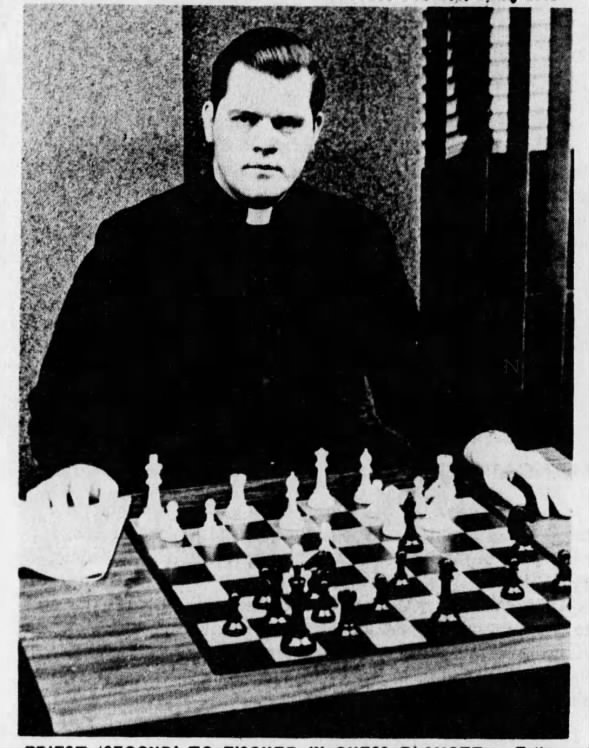
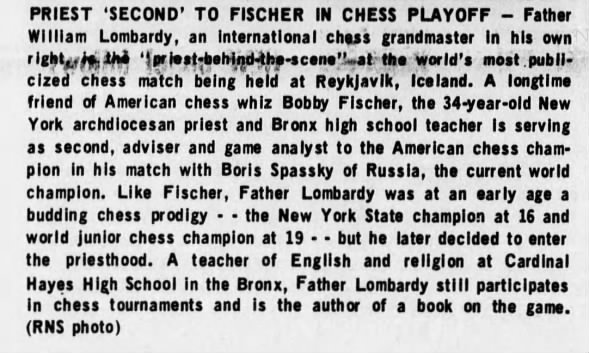 Priest 'Second' To Fischer In Chess Playoff 20 Jul 1972, Thu The Catholic Advance (Wichita, Kansas) Newspapers.com
Priest 'Second' To Fischer In Chess Playoff 20 Jul 1972, Thu The Catholic Advance (Wichita, Kansas) Newspapers.com
The Cincinnati Enquirer Cincinnati, Ohio Thursday, July 20, 1972 - Page 2
Silence To Reign In Chess Game
Reykjavik (UPI) — Organizers of the Boris Spassky-Bobby Fischer world chess championship Wednesday said they hoped television cameras would be back in the hall for Thursday's fifth game.
Workers built sound-proof boxes at the entrances to the playing hall during the afternoon to block the sound of clattering dishes and voices from a nearby cafeteria. German judge Lothar Schmid said he heard noises during Tuesday's fourth game.
THE FIFTH game is scheduled for Thursday at 5 p.m. (1 p.m. EDT) with Spassky opening with white. The Russian, defending for the first time the world championship title he won in 1969, holds a 2.5 to 1.5 advantage in the 24 matches series.
(In New York, lawyers representing Fischer and Chester Fox, who bought all film and television rights to the games, met to discuss whether or not cameras will be allowed to record the event.)
Gudmundur Thorarinsson, president of the Icelandic Chess Federation, said “Fischer is adamantly opposed to all cameras but we know there is one solution he'll accept.” ([Would that “solution” happen to be the silent, automatic “closed-circuit cameras” he was originally misled to believe would be in use?])
“I cannot disclose which,” he said.
The 29-year-old challenger relaxed in his presidential suite at the Loftleider Hotel Wednesday reviewing moves from Tuesday's game. Experts said Fischer was fortunate to escape from the game with a draw.
Running through translated comments from Icelandic grandmaster Fridrik Olafson criticizing one of his moves, Fischer nodded and said; “Yes, I agree it was not very clever.”
Grandmasters in the Icelandic capital for the championship said Spassky played a couple of dubious moves late in the game which cost him victory.
Aides said Fischer was surprised by Spassky's strong opening attack and said the challenger was only too pleased to escape with half a point.
“I told you it would be a tough match once we got down to the tacks. Bobby is in fine shape. He gets a lot of sleep and does not sm*** big c**ars or chew through three packets of c**ar****s like Mr. Byrne.” Fischer's second, the Rev. William Lombardy, said smiling at U.S. grandmaster Robert Byrne.
Spassky was “relaxed, smiling and satisfied with everything, especially the food. Thorarinsson said after visiting the Russian in his hotel.
Unlike Fischer, who rarely moves out of his suite ([which is no mystery, since threats on Fischer's life were issued by radicals among the Anti-American, Racist Icelandic population]), Spassky walks around freely and takes most of his meals in the eighth-floor restaurant. He has a special liking for Icelandic lamb.
Fischer's favorite dish is “skyr,” an Icelandic milk specialty. He arrive for the fourth game seven minutes late because he did not want to rush through a meal at the hotel cafeteria.
Poor weather prevented Spassky from playing tennis, a favorite pastime, but American sources said Fischer visited the Keflavik U.S. Air Base twice to bowl.
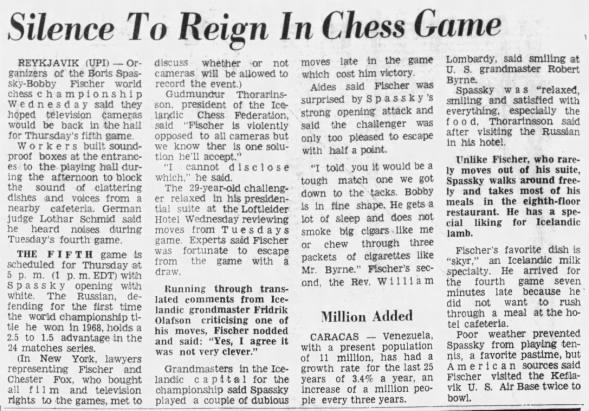 Silence To Reign In Chess Game 20 Jul 1972, Thu The Cincinnati Enquirer (Cincinnati, Ohio) Newspapers.com
Silence To Reign In Chess Game 20 Jul 1972, Thu The Cincinnati Enquirer (Cincinnati, Ohio) Newspapers.com
The York Dispatch York, Pennsylvania Thursday, July 20, 1972 - Page 1
Fischer Quiet: Chess Match Begins With No Word of Protest
Reykjavik, Iceland (UPI) — Bobby Fischer and Boris Spassky sit down at the chess board again today. But this time it is different—Fischer isn't threatening to walk out.
The fifth game of the 24-game world chess championship match began this afternoon, with titleholder Spassky, a 35-year-old Russian, playing white—which means he makes the first move.
Fischer, 29, has protested every previous game, mostly because of ([disruptive men operating]) television cameras in the playing hall. He even failed to turn up for the second game, forfeiting it to Spassky. ([Colonel Edmondson {of the US Chess Federation} said that under the rules of a world championship tournament, Fischer had a right to demand the removal of the {disruptive men operating the cameras} and to refuse to play if they were not removed! - New York Times, New York, New York, Thursday, July 20, 1972.])
The Amarillo Globe-Times Amarillo, Texas Thursday, July 20, 1972 - Page 1
The psychological warfare at the Fischer-Spassky chess match in Iceland is mild ([says who? So far threats have been made on the lives of Fischer, his entourage and the “foreign” press. Underhanded tricks and malicious schemes by Soviets have scarcely been mentioned in press, albeit, real as they are. The location cherrypicked by the Soviet is notoriously Anti-American and Racist for starters, and certainly no “accident” The underhanded contract suppressing fair coverage, and inhospitality toward all world media is no mere “coincidence”]) compared to some encounters in the history of the game.
Chess buffs say the mental combat occasionally becomes physical.
The 19th century English chess player Joseph Henry Blackburne once became so enraged during a game with the Austrian master Wilhelm Steinitz that he picked his opponent up and almost threw him out the window. — BARBARA BOONE.
([Perhaps Steinitz had asked for retaliations as he had made a career of rubbing others the wrong way, namely, his petty jealousy, scathing mockery and personal scheming against the legacy of Paul Morphy. As reiterated in 1897 by the “Rochester Post Express” the following anecdotes of the great master's little peculiarities:— … The happiness of “the Bohemian Caesar,” as Steinitz fondly called himself, was not unalloyed. Paul Morphy was his bête noire. He attempted to undermine the pedestal upon which Morphy's glory is everlastingly established. But he did not succeed. If Blackburne makes a brilliant combination, he calls it a “bit of Morphy.” But no one ever heard anybody call a brilliant finish a bit of Steinitz…”
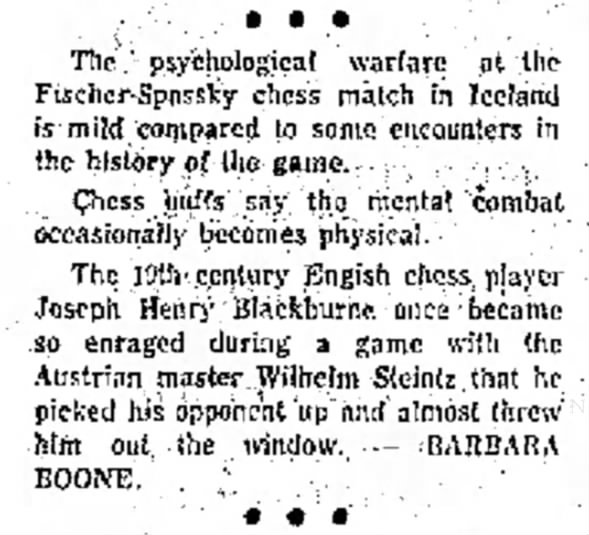 Psychological Warfare 20 Jul 1972, Thu The Amarillo Globe-Times (Amarillo, Texas) Newspapers.com
Psychological Warfare 20 Jul 1972, Thu The Amarillo Globe-Times (Amarillo, Texas) Newspapers.com
Poor Sportsmanship:— on the contrary, it seems many of Fischer's critics ail from a “bit of Steinitz” —:
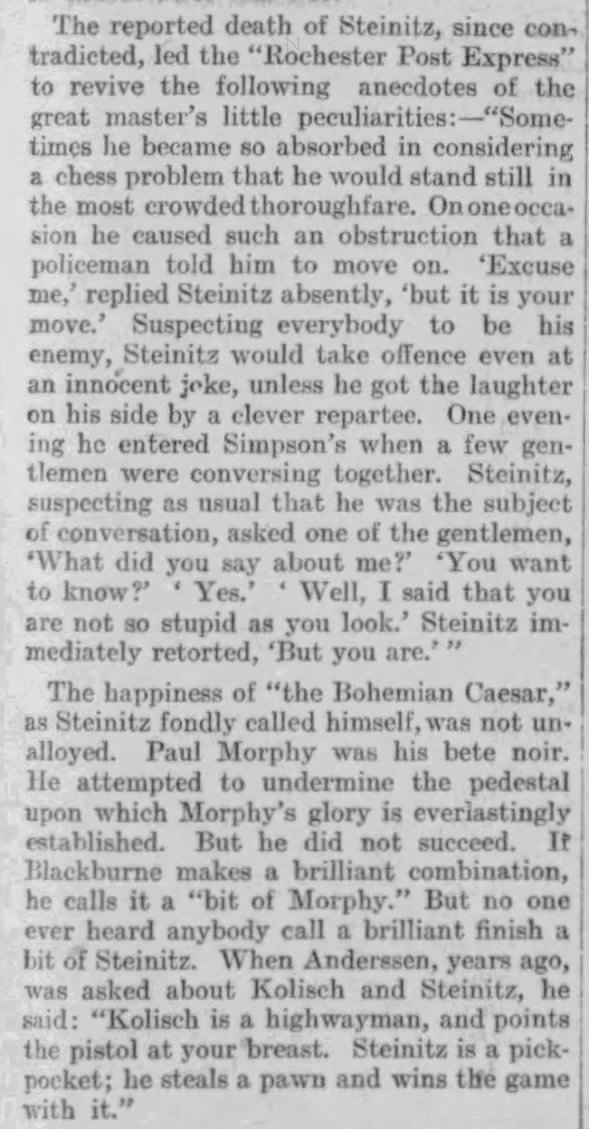 The Reported Death of Steinitz 19 Jun 1897, Sat The Age (Melbourne, Victoria, Australia) Newspapers.com
The Reported Death of Steinitz 19 Jun 1897, Sat The Age (Melbourne, Victoria, Australia) Newspapers.com
Tucson Daily Citizen Tucson, Arizona Thursday, July 20, 1972 - Page 1
'The Big Game' Ain't Baseball by Judith Terlizzi, Citizen Staff Writer
When your neighbor asks about today's game, chances are good that the contest he's referring to was played in Iceland, not Yankee Stadium.
The Bobby Fischer-Boris Spassky world chess championship tournament has local tongues tripping over “Reykjavik,” and local hands dusting off chess boards and sweeping chess books off store shelves.
“We've been having problems keeping popular chess books in stock since the whole thing (the tournament) began,” said Mary Scheeler, a Book Mart employee.
Morris Rosenthal, owner of Focus on Books, said his usually large supply has dipped low in the last few weeks.
Although several stores reported increases in chess book sales, few have noticed change in the sale of chess sets. However, Jim Davis, owner of Toy Mart, said: “We've sold as many sets in the last couple of days as we usually do in a couple of months.”
Tucsconians whose chess games, have become rusty and people who don't know a castle from a condominium are taking their questions to members of the Tucson Chess Association and University of Arizona Chess Club.
“The Fischer-Spassky match has drawn a great deal of interest,” said Chester Czerniak, spokesman for the local chess association. Interest generated by the American and Russian forced the association to move to a larger meeting hall a couple of weeks ago in order to accomodate visitors and members.
CAPTION: 'What Would Fischer Do?'
Ten-year-old Patrick Czerniak, a member of the Tucson Chess Association, mulls over his next move. He is four years older than the youngest association member. The group, which meets weekly, plans to replay the Fischer-Spassky games.
The Shreveport Journal Shreveport, Louisiana Thursday, July 20, 1972 - Page 1
Fischer, Spassky Begin Fifth Game
Reykjavik, Iceland (UPI) — The fifth game of the $250,000 world championship chess match started on schedule today—without the television cameras opposed by American Bobby Fischer.
Sources in New York said a tentative agreement was reached earlier in the day permitting the ([CLOSED-CIRCUIT, automatic, un-manned, stationary]) cameras to record the event. Icelandic organizers said they were 90 per cent certain the cameras would be allowed back in the hall for today's game. ([But the Soviets do not want the tournament filmed under any circumstances. Their humiliating defeat must be censored via media blackout without exception.])
There was speculation earlier that Fischer would relent in his protests and allow the game against world champion Boris Spassky of Russia to be broadcast on closed circuit television. ([Naturally, because “Closed Circuit Cameras” are the devices Fischer was misled to believe would be utilized from the outstart. The same closed-circuit devices Fischer stated emphatically, was his desire, all along. Closed-circuit camera was used in the opening of game 3, to which Fischer had no objections. Instead, the Soviets and Icelandic organizers took it upon themselves to bring in bulky, human-operated crews of men, operating large television equipment to disrupt the match. When Fischer protested the deliberate intrusions during game one, including one man with a camera reported by Golombek as crawling on the roof and training his camera on Fischer, whom on Cramer's insistence the trespasser was removed by police. Lothar Schmid angrily declared the shut down of that camera man to the whole world, stating it was not his decision. The confession of guilt on behalf of organizers, duly noted! The rules of the match were simple: If Fischer demanded the visibly, and audibly disruptive men operating the cameras be removed, they were to be removed, without delay! But the Soviet/Icelandic organizers chose to break those rules, then fed false reports about the event through to western newspapers. These events, circumventing truthful coverage because the match was buried in an Anti-American, Racist haven near the North Pole, is a clear motive for the Soviets to cherry pick Reykjavik as host for the 1972 tournament, to bury coverage for all eternity.])
Des Moines Tribune Des Moines, Iowa Thursday, July 20, 1972 - Page 21
Forenote: Reports like these are surfacing early in the match noting some upsurge in sales on chess books, and chess boards with some retailers, whilst others claim no noticeable increase. Soviet Propaganda, as all propaganda works like this: Put the false news stories in circulation, and the pay off is when “…people hearing something enough times from enough different places, people repeating it to each other that you reach a point where you have solidified your position. If we can solidify the position we have achieved something the other side cannot overcome because it's very tough to break common knowledge…” thus far, in 1972, we have the Soviet sources and their liaisons issuing falsified accounts. Numerous times I have pointed out blatant contradicting stories, which all have one thing in common: Portray Fischer in a negative light. Whether the “cameras” in question were:— “Small, Automatic Closed Circuit Video Cameras” or were they “Large Bulky Television Cameras operated by television crews of men” is just one isolated example of the rubbish pouring out in the press. This confusion was used to convince the American public that Fischer was supposedly, a “greedy capitalist” and conveniently, the media brushed the fact that Mexico and Australia issued HIGH BIDS, under the rug for when the Soviet scoffed at Australian $225,000… throwing temperament to the wind, and in a juvenile fit, threatened to forbid Spassky to play *crickets* went the media. Fischer has been portrayed as outright, “Un-American” a “poor role model”, “lacking in respect” “lazy” “disrespectful”, so forth and so on, the baseless Ad Hominems. The result is all that matters: The Soviet Propaganda turned off a major support base of millions of people for Fischer and drove a wedge between that public and their participation in chess. That, was the agenda the Soviet, carefully calculated months before the match, via allies in western media. None need attempt to convince me the Soviet were interested in ever “promoting” the game. The title was nothing more than a means to an end for political prestige and influence, to bolster their lie of Imperial Soviet Supremacy. Just as Fischer said, so many times, “Chess is a major propaganda vehicle with the Soviets.” and the Soviets would rather destroy the game out of petty jealousy, than hand over the crown to a foreign power. Meanwhile, Americans who blindly believed the Soviet Propaganda pouring out of Reykjavik into their daily newspapers, are a disgraceful example to other Americans and do not represent how the majority of mainstream Americans, the silent majority, genuinely regarded, and respected our champion!
Des Moines Chess Players Excited About Publicity - They're Watching Spassky-Fischer Match Closely by Stephen Gross
DEDICATED Des Moines chess players are excited about all the publicity the game has been getting lately, but the general public seems to be greeting the whole thing calmly.
Members of the Des Moines Chess Club, headquartered at the YMCA, and local high schools teams that compete around the state and sometimes the nation are following the international championship between Boris Spassky of the Soviet Union and American Bobby Fischer enthusiastically.
“Everybody is really happy to have an American in the tournament,” said Mark Bellnap, of 1240 Fifth Avenue, president of the Des Moines Chess Club. “There hasn't been an American world champions since about 1860.”
But there has been no noticeable increase in chess club members in recent weeks, Bellnap said.
The only other index of public interest, the sales of chess sets in Des Moines stores, has not indicated a wave of enthusiasm.
When contacted by The Tribune, several department stores said they stocked chess sets only for Christmas sales or not at all.
Some stores reported having chess sets left over from Christmas and only one noted “very unusual” sales of chess sets since the international tournament began publicizing the game.
MEANWHILE Des Moines chess buffs, mostly young people with a sprinkling of veterans who have attended many chess tournaments in the city over the years, take the whole thing seriously. Most of them don't expect to become “grand masters” like Fischer, but they aren't exactly slouches at the game either.
Bellnap, at 25 a Class A chess player (rankings run from lowest Class E up through Class A and on to the honored ratings of expert, master and grand master), estimates that most players in Iowa tournaments are in Class C and Class D.
He classified himself and his friends in the Des Moines Chess Club—about 20 people— as “not really serious” about the game.
That means they only spend two weeks before a tournament studying strategy books that outline the hundreds of attacks and defenses possible in chess.
And that is far from what it takes to become a master, said Bellnap, who said he became “seriously” involved with chess in high school tournaments and now plays only about once a week at Friday night club meetings.
During the year he also plays in the smaller Drake University Chess CLub, which this year qualified to compete in the North American Intercollegiate Tournament at Toronto, Ontario.
A Roosevelt High School player, 16-year-old Douglas Eckley of 529 Waterbury Circle, said he is at the best age to learn chess and intends to keep devoting one hour a day to chess after he finishes high school and college.
Sometimes Eckley spends his daily practice hour just reading books and magazines about chess maneuvers, and he admits he has his eye on achieving a high rating.
“I don't know if I'll ever be a grand master, but it will be fun,” said Eckley, who in April accompanied six other Roosevelt players to the annual National High School Championship in New York City.
Right now, Eckley is happy about playing for Roosevelt, which he said has been a “big chess school” for about four years.
JOHN PENQUITE, 2935 Cottage Grove Road, a 37-year-old expert-rated chess player finds himself one of the elder members of the Des Moines Chess Club and says he no longer worries about his rating.
But he's taking advantage of his early retirement (he is a mathematician who occasionally does consulting work for research projects at major universities across the country) to resume the two hours a day of practice and study that made him a tournament winner when he was a Des Moines high school student in the early 1950s.
But at 37 he said he is over the hill as a chess player.
“By the time you are 35 you begin to lose your ability for prolonged concentration,” Penquite said. “Extensive tests run during chess tournaments have shown that chess is one of the most fatiguing games there is,” he said.
As much as he enjoys chess, Penquite doesn't advise trying to learn the game at his age.
“It's hard for an older person to learn the game,” he said.
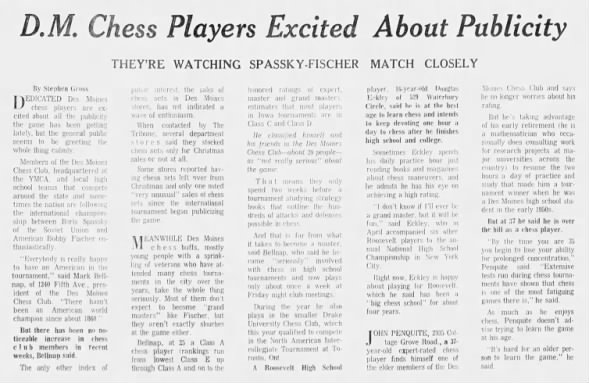 Des Moines Chess Players Excited About Publicity 20 Jul 1972, Thu Des Moines Tribune (Des Moines, Iowa) Newspapers.com
Des Moines Chess Players Excited About Publicity 20 Jul 1972, Thu Des Moines Tribune (Des Moines, Iowa) Newspapers.com
Chippewa Herald-Telegram Chippewa Falls, Wisconsin Thursday, July 20, 1972 - Page 16
Fischer 'Only Just Started': No Protests During Fifth Game of Chess Title Match
Reykjavik, Iceland (UPI) — Bobby Fischer and Boris Spassky sit down at the chess board again today. But this time it is different—Fischer isn't threatening to walk out. ([if that's so, it's because Soviets aren't forcing disruptive men with cameras in Fischer's face to throw his concentration off balance]).
The fifth game of the 24-game world chess championship match begins at 5 p.m. (1 p.m. EDT) with titleholder Spassky, a 35-year-old Russian playing white—which means he makes the first move.
Fischer, 29, has protested every previous game, mostly because of television cameras in the playing hall ([which are operated by clutzes making a lot of unnecessary visual and auditory distractions]). He even failed to turn up for the second game ([due to boycotting organizers for blatant refusal to enforce the rule that permits the competitors to demand disruptive camera men be ejected if disrupting concentration after which organizers, in spite of being in receipt of a valid protest in writing, delivered before the deadline, illegally]), forfeiting it to Spassky.
Going into the fifth game, Spassky leads with 2½ points to Fischer's 1½. The American challenger needs 12½ points—a win counts one point, a draw ½ for each player—to take the title, while the defending champion needs only 12 to retain the championship.
Although the question of the television cameras remained unresolved, it appeared not to bother Fischer — for the moment. Organizers said they were awaiting word from New York on whether the closed-circuit cameras could be re(?)installed(? [When were closed-circuit cameras ever in use by organizers, except in the back room during the opening of game 3 to be “uninstalled”?])
A spokesman for the company that has bought the film rights, Chester Fox, Inc., said: “We hope to resolve the problem before today's game starts. But cameras must no bother Mr. Fischer. That is our prime and principal concern.” ([Since when? After the Soviets had reaped a couple points to its advantage?])
Fischer's second, Father William Lombardy, said the New Yorker “only just started” his campaign to wrest the title from Spassky. Lombardy, a Catholic priest who also is a grand master, admitted Fischer “had a narrow escape in the fourth game but don't forget how he demolished Spassky in the third.”
Iceland grand master Fridrik Olafsson said “the next couple of games could be decisive.”
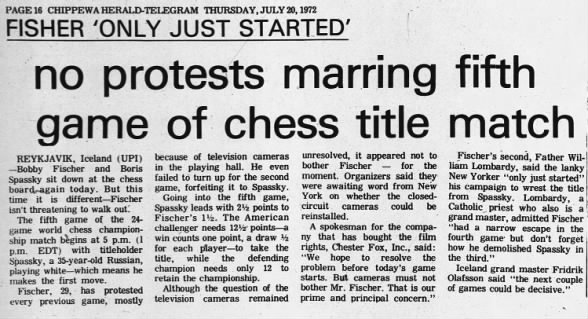 No Protests During Fifth Game of Chess Title Match 20 Jul 1972, Thu Chippewa Herald-Telegram (Chippewa Falls, Wisconsin) Newspapers.com
No Protests During Fifth Game of Chess Title Match 20 Jul 1972, Thu Chippewa Herald-Telegram (Chippewa Falls, Wisconsin) Newspapers.com
Honolulu Star-Bulletin Honolulu, Hawaii Thursday, July 20, 1972 - Page 6
Fischer Wins, Evens Series With Spassky
Reykjavik (UPI) — U.S. grand master Bobby Fischer tonight forced world champion Boris Spassky to resign on his 28th move and won the fifth game of the world chess championship.
Fischer's surprise victory in what had been an even game through 22 moves evened the score in the 24-game, $250,000 world championship at 2½ games each.
Fischer played his 27th move, a bishop to his queen rook five, and Spassky looked intently at the table for a full minute. Then the Russian looked up at Fischer and held out his hand.
The crowd packed in the grand hall went wild, stomping their feet, clapping hands and yelling “Bobby, Bobby.”
Chess enthusiasts in the cafeteria, where they had been munching hot dogs and drinking soda pop and watching the game on closed circuit television, broke into wild cheering and hurled plates and saucers and glasses into the air.
Spassky's second, Svetozar Gligoric, said the turning point in what had been an evenly-fought match came after the 25th move when Spassky erred in choosing the wrong plan and doubled his rooks on the king bishop rank.
“Fischer already then had a favorable position and one he is expert at playing,” Gligoric said. “Both Spassky's bishops were locked and he was in trouble.”
The Ottawa Citizen Ottawa, Ontario, Canada Thursday, July 20, 1972 - Page 3
Fischer, Spassky Spats Spark Local Moves: Chess Sales Climb by Patricia Cote
([Public hysteria, hostilities developed between the world's two most powerful, armed to the teeth nuclear superpowers led by the U.S.-Russian White Supremacist Empires who have kept the world gripped by the hair of their head and suspended in a state of panic of an imminent WWIII and now, political ideologies come down to a clash of intellectualism over a chessboard in a Soviet stronghold. That couldn't possibly have anything to do with the mounting tension… could it?])
The ERRATIC WORLD-CHESS CHAMPIONSHIP in Iceland may be responsible for the increase in sales of chess sets in some Ottawa stores.
Nothing like in Iceland, mind you, where the sudden enthusiasm for chess finds people playing in the streets, but at least three Ottawa stores have had anywhere from a slight to a 50-per-cent increase in sales.
The store that seems to have benefited most is the Davis Agency on Sparks Street, which reports a 50-per-cent increase in sales. Buyers are spending an average of $50 for a set. The carved wood sets appear to be the most popular.
Freiman's on Rideau Street also reports an increase in the number of people buying sets during the last two to three weeks. An equal number of people come in just to look.
John Thompson of the Simpson-Sears store at Carlingwood reports that many people are purchasing travel chess sets. “I don't know whether it's the chess championship or whether they just want something to keep them occupied while they are traveling on vacation,” he said.
Seven other stores that sell chess sets say they have experienced no increase in sales lately.
Salesmen at Evans and Kert at Carlingwood and Green Dragon gift shop on the Sparks Street Mall say chess has enjoyed increasing popularity in recent years. Both stores sell a good average of chess sets every day. The Green Dragon reports it sells five to seven sets a day.
The Havre Daily News Havre, Montana Thursday, July 20, 1972 - Page 3
EDITORIALS: Back Bobby Fischer
Some people have goose bumps over the world championship chess match being played in Reykjavik, Iceland and fans find the battle of personalities involved, that of Bobby Fischer of the United States and Boris Spassky of the USSR, is more interesting than the movement of the pieces on the chess board.
Master chess players we are told are sensitive folks who for the most part have keen minds and are thinking many moves ahead of the ordinary chess player. A tremendous amount of psychology is involved as is obvious in the current match.
The impression a reader gains is that the best players in the world are prima donnas and that Fischer in particular, is a spoiled young man.
But is he?
Is he the arrogant, demanding, temperamental person who abounds with egotism or is he a player who uses adverse description to completely paint a picture of a person involved with the deepest of concentration?
About a year ago the public made Fischer a hero and there was confidence expressed in some quarters that Fischer would have no trouble defeating the world champion, Spassky, when they met. After winning some big matches this year including defeating the best in South American, Fischer became an idol. Some writers claimed he is a human begin and worthy of favorable publicity but by the time Reykjavik showed up he was something else in deportment ([due to isolating the match in a hostile Anti-American, racist location which enabled Soviets to control news reports]).
As we see it he is no different than many a sports hero. The very nature of a chess game makes his ([carefully filtered reports to put a favorable Soviet-spin on Fischer's]) actions seem contrary to the tenets of good sportsmanship. But Spassky ([whose every action is also controlled by Moscow]) is now acting a little difficult. Maybe the competitors are trying to “psyche” each other. This, however, is not too likely because these chess masters know what the game is about.
They naturally want the conditions under which they play to be as ideal for themselves as individuals as possible. So we do not think it is arrogance on the part of Fischer in asking photographers to refrain from setting off flash bulbs in his face while he is engaged in a match. And we do not think he is demanding when he requests that the audience be seated at least five rows from the playing platform and that they do not engage in their own chess games, moving pieces and talking among themselves.
With the stakes as large as they are plus the reputations of Fischer and Spassky we do not think it unreasonable to request that lighting be so directed that there is no glare on the chess board.
No do we think it is wrong that the men quibbled a little over financial arrangements and bargained for the best returns. Wouldn't you if you were among chessdom's best? Fischer and Spassky make a living at the game.
Keep in mind that in Russia high ranking players are subsidized, lionized and hailed for their accomplishments.
Spassky is the favorite but Fischer is capable of registering the upset and if he does the United States will gain a tremendous amount of recognition. Let's hear it for Bobby Fischer, different though he may be than most of us who can think of only one move at a time! HCW
The Miami News Miami, Florida Thursday, July 20, 1972 - Page 22
You Don't Have To Be an Intellectual To Play Chess by Jeff Klinkenberg
Bernie Schmidt was trying to explain a chess move used by Bobby Fischer to someone who just could not understand so finally he said he had an idea and ran out the door.
He was back in a moment, carrying a cardboard box under his arm and he said, “I always keep a chess game in the trunk of my car. I'm always equipped.”
He dumped the pieces onto the board and began setting them up. Then he ran to his bedroom and returned with a book and opened it to a section outlining moves used by Bobby Fischer.
Schmidt started moving pieces all around, his hands a blur, like a riverboat gambler playing the shell game. All the time he was talking.
“Look at this,” he said. “This move was invented by Lopez, a great player. It was called the Spanish Torture.”
He took a sip of iced tea from a silver goblet and asked, “You notice how quickly I made these moves? This is how I teach chess. Fast. There is nothing worse than dullness and boredom.”
Bernie is not a boring man but he would not like to be considered eccentric either. It's just that when he is talking chess, he is very enthused. It's his magnificent obsession.
“I hope I don't sound like a raving, fundamentalist preacher,” he said. “I just like the game.”
He also likes the publicity Bobby Fischer has been getting lately in Iceland, where he is contesting the world chess championship with Boris Spassky, a Russian. Fischer made a lot of people angry over the weekend ([when the Soviet-controlled Icelandic Chess Fed and associates released more misleading reports about the details behind Fischer's balk at disruptive men operating large, bulky television cameras, that according to the rules previously laid down, permitted Fischer to demand removal of all cameras if they were creating interference with concentration, of either player… and organizers brazenly broke the rules, and refused]) when he refused to play before a ([disruptive television camera crew]) and walked out. ([Many people are having their opinions shaped by Soviet propaganda, and haven't a clue to know what Soviet propaganda looks like vs. legitimate news.])
But Bernie Schmidt of Hialeah thinks he is okay. “I'd like to see him get ten times the publicity he's getting,” he said. Even bad publicity for chess, Bernie figures, might be good for Bernie Schmidt and what he's trying to do.
Bernie's a teacher. He considers himself a very good one. “The very best chess teacher in the area,” he said. He's got ammunition to prove it. The United States Chess Federation rates him as an expert, which is one category below a master—the very best. One of his pupils, Luis Alfonso Jackson, recently won the high school state championship.
Schmidt teaches at the Coral Gables Youth Center on Mondays and at the Miami Shores Recreation Center on Tuesdays. He'd like to teach enough to make a living wage.
He's got 17 students at Coral Gables, 40 at Miami Shores. He could reach more, he believes, if only people would realize that chess is not a game played only by Greenwich Village types and old men.
“For years,” Bernie was saying, “people who play have had to stand in the shadows because there was a stigma attached to the game. You were made to feel like a Bobby Fischer without a trial, you know?
“We were made out to be fr**ks. It goes along with the anti-intellectualism in this country. I play basketball with kids at Coral Gables and they looked at me with astonishment when they found out I play chess.”
Bernie says, “Chess is a game of the people,” “In the clubs in Miami we've got cabbies, butchers, cops, social workers and body guards playing. We even have an ex-prizefighter.”
Bernie, 32, and his wife Joan, who recently tied for fifth in a national women's tournament, like chess so much they travel all over the South to watch tournaments during their vacation, “Until our money runs out,” Bernie said.
They have a trophy case and two large shelves filled with books about chess. “I think we've got the most complete library in the South,” he said. “I counted them one day. I've got 110 volumes.”
He became interested in the game after he was kicked off the baseball team at Bethany College during his freshman year. “My coach told me to pick up a ball, I asked why, and that was it,” he said.
Instead, he picked up a chess game and found he was very good at it. Now he tries to get his message to his pupils who range in age from nine to 17 and it is a tough job.
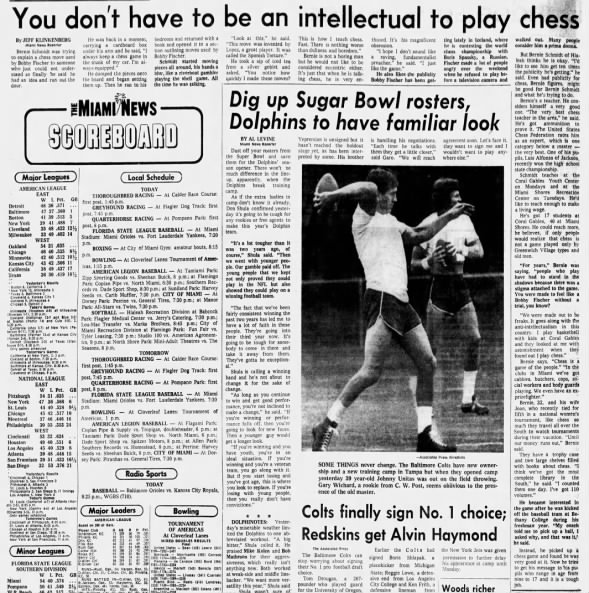 You Don't Have To Be an Intellectual To Play Chess 20 Jul 1972, Thu The Miami News (Miami, Florida) Newspapers.com
You Don't Have To Be an Intellectual To Play Chess 20 Jul 1972, Thu The Miami News (Miami, Florida) Newspapers.com
Aiken Standard Aiken, South Carolina Thursday, July 20, 1972 - Page 14
The First Draw In The Fischer-Spassky Match by Dr. Lee Hyder
Editor's Note: This article is a continuation of the discussion of the Fischer-Spassky match by Dr. Hyder and the Aiken Chess Club. It is based on discussions at the Club meetings. Dr. Hyder is a former South Carolina Chess Champion.
Newcomers to the game of chess frequently wonder how a game of chess can arrive at a draw, or indecisive result. The rules of chess specify several in which this can happen. A game is drawn in case of stalemate. This occurs when one player can make no legal move, but his king is not under direct attack. (Position 1).
Draws are more usually attained by agreement between the players, when neither can find a way to win.
This was the case in the fourth Fischer-Spassky game. In the final position, an attack by either player could be readily defended. The combatants therefore agreed to the draw. Each player received ½ point.
Despite the indecisive result, it was a hard fought game. Spassky took advantage of the fact that Fischer is the most predictable of the top chessmasters. He has several favorite sequences of opening moves which he plays whenever possible. Spassky had studied one of these and worked out a strong reply. (Position 2).
He allowed Fischer to capture one of his pawns, but the capture left Fischer's pieces in an awkward position.
Fischer had to defend himself carefully throughout most of the remainder of the game. He finally broke up the attack at the expense of one of his own pieces.
It will be interesting to see how Fischer plays in the sixth game, where he will again have the White pieces and the first move. He will have to play differently to try to gain some advantage.
No one knows whether Fischer has prepared openings for this match which he has never played before. Thus far he has not tried any.
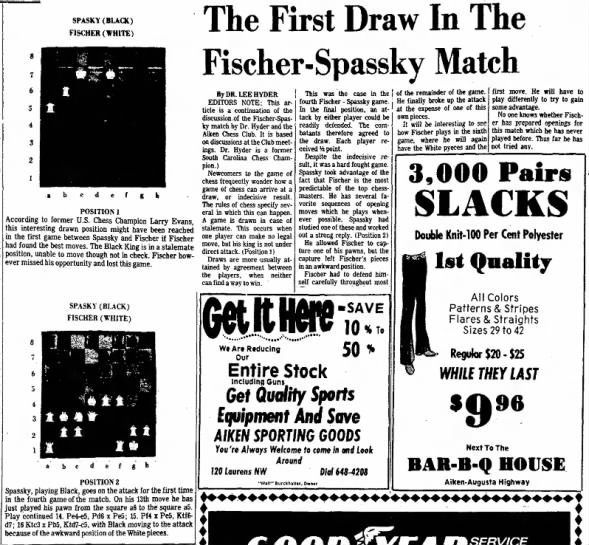 The First Draw In The Fischer-Spassky Match 20 Jul 1972, Thu Aiken Standard (Aiken, South Carolina) Newspapers.com
The First Draw In The Fischer-Spassky Match 20 Jul 1972, Thu Aiken Standard (Aiken, South Carolina) Newspapers.com
The Lexington Herald Lexington, Kentucky Thursday, July 20, 1972 - Page 35
Uncertainty Keys Chess Match
Reykjavik, Iceland (AP)—The score of 2½ points for champion Boris Spassky and 1½ for challenger Bobby Fischer was the only matter of certainty on the eve of Thursday's fifth game of the world chess title match.
Still alive was the question whether Chester Fox's movie cameras will be back in the hall for the fifth match. Fox, who has sunk a reported $160,000 into exclusive movie rights, says they will.
But Fischer's personal representative, Fred Cramer, said the 29-year-old American challenger “has not changed his mind” about his objections.
Fischer claims the ([disruptive men operating large, bulky television]) cameras disturb his concentration. Their presence was a prime reason for his boycotting the second game, which he ([the Icelandic/Soviet organizers illegally]) forfeited to the 35-year-old Soviet titleholder, and for removal of the third game to a private room devoid of ([disruptive television]) cameras ([crew men]).
The chess genius from Brooklyn had threatened to fly back home if the third match was not played privately ([so the circulated rumors suggested for weeks, however, Fischer's second William Lombardy made the disclaimer he knew nothing of it, and the same confirmed by Fischer's lawyer who stated his purpose for being in Reykjavik, was because Fischer intended to compete]). The fourth game was moved back to the main exhibition hall, but still without ([large, bulky television]) cameras.
Chess grandmasters, not known to agree on anything, were split on who would hold the title after the 24-game series.
“In this match anything is possible,” said a Yugoslav, Dragoljub Yanosevic. “Perhaps Fischer is playing better than Spassky, but Spassky is one point up. He can now be content with draws.”
American Robert Byrne did not agree: “The match is going well. Bobby will win, but by how many games I don't know.”
Spassky needs only 12 points to retain the title. Fischer must score 12½ to take it out of the Soviet Union, where it has reposed since 1948. A win is worth one point, a draw one-half point.
After meeting with officials of the sponsoring Icelandic Chess Federation, Fox said he might be reimbursed by the federation for the third game.
“I am hopeful everything will work out,” he said. ([Actually, based on the track record of Fox Inc., I doubt that was ever the case, or things would have went smoothly, since after all, Fischer wanted only silent, automatic, stationary closed-circuit cameras and Fox brought in an army of television camera crews fit for a major league soccer tournament to swarm Fischer and Spassky… hoping Fischer would drop points in the process]) “The Icelandic people are very honorable.” ([and very racist. Is it honorable to restrict entry of persons who are of African ancestry, for instance? Or perhaps the raving Anti-American atmosphere that's flaming in Reykjavik over the NATO base at Keflavik resulting in threats on Fischer's life and the lives of “foreigners” patronizing the match. But Chester Fox Inc., thinks racism and chauvinist nationalism, is “honorable,” which reveals how colored his personal judgment has become clouded by Soviet Imperialism.])
Spassky won the first game ([due to Fischer reporting his concentration was disrupted by Fox's crews of distractive camera men]) and had a 2-0 edge when the second was declared a forfeit ([and illegally handed to the Soviet team by Icelandic officials.]) Fischer beat the Russian for the first time ever in the third game ([due to the absence of the Soviet ally Chester Fox Inc.'s army of camera crews]). In Tuesday's contest, Spassky beat off an opening attack by the challenger, to force a draw ([also, without the menacing distraction of Fox Inc's army of audibly, and visually disruptive crews of men operating large, bulky television cameras.])
The Los Angeles Times Los Angeles, California Thursday, July 20, 1972 - Page 187
Fischer-Spassky Moves: Valley Chess Club to Replay Icelandic Games for Analysis by Pat Bryant
SUN VALLEY—Russian chess champion Boris Spassky's games with American Bobby Fischer will be replayed with magnetic pieces on a four-foot-metal board—and then analyzed—on Mondays, Thursdays and Fridays at 8 p.m. at the Valley Chess Club.
The Iceland world championship matches will last a maximum of 24 games.
That's hardly an evening's work for the Valley group. It plays up to 60 games three nights a week, starting at 7 p.m. and lasting beyond midnight at the club headquarters, 10919 Saticoy St.
The club, with 250 members between the ages of 5 and 95, originally met for its game sessions at a city park which was an unsatisfactory arrangement because the park lights went off at 10 p.m.
Now the club meets in an old warehouse donated by one of the members, and the $12 annual dues pay for utilities and the purchase of chess pieces, chairs and books on chess strategy.
The members made their own tables and boards. Sigmund Goldstein, club spokesman, said that the historical significance of the Iceland games will be explained as the large chess pieces are moved across the board. Valley players, who Goldstein described as a heterogeneous group of students, lawyers, carpenters, salesmen and musicians, will practice their own maneuvers before and after the championship demonstrations.
Goldstein explained the growing popularity of chess because “it is a fight in which no one is hit. You get rid of your aggressions by checkmating.
“The skill of the game is to force your opponent to play according to your plans which you plotted before the game began. The game is all over when your opponent starts making his own decisions.”
He said beginners tend to play chess by moving their pawns like checker pieces instead of plotting long-range strategy.
“You move the pawns just to get the bishops out,” he said.
Premature Attack
“Beginners also make the mistake of attacking too soon, using only the queen for power while most of the other pieces are left in the background.”
Beginner's tournaments with free lessons are held at the club on Thursdays.
Tre Valley group is headquarters of the Southern California Chess League comprised of 109 clubs with more than 6,000 members.
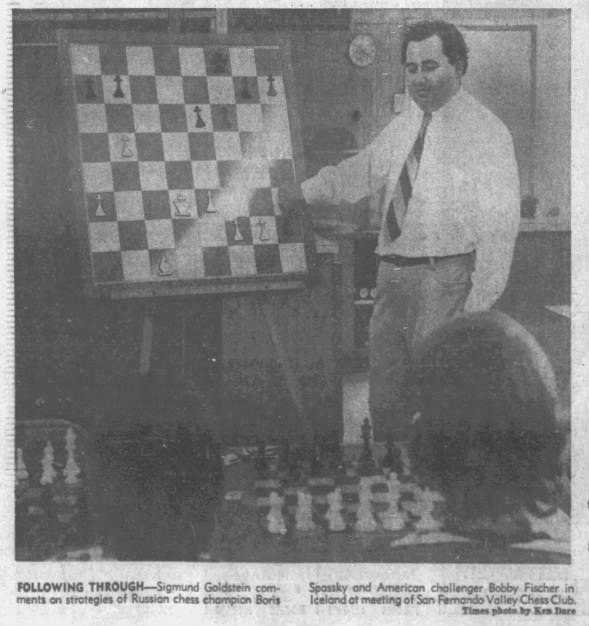 Following Through 20 Jul 1972, Thu The Los Angeles Times (Los Angeles, California) Newspapers.com
Following Through 20 Jul 1972, Thu The Los Angeles Times (Los Angeles, California) Newspapers.com
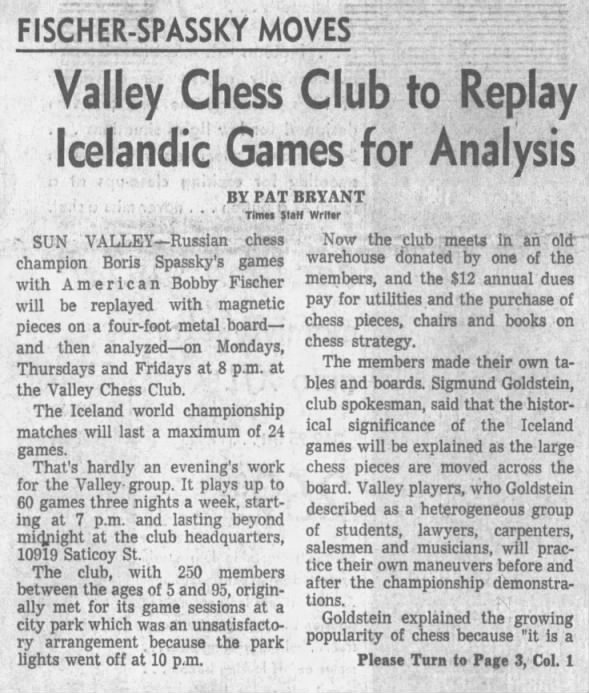 Valley Chess Club to Replay Icelandic Games for Analysis 20 Jul 1972, Thu The Los Angeles Times (Los Angeles, California) Newspapers.com
Valley Chess Club to Replay Icelandic Games for Analysis 20 Jul 1972, Thu The Los Angeles Times (Los Angeles, California) Newspapers.com
The Des Moines Register Des Moines, Iowa Thursday, July 20, 1972 - Page 5
Chess Fans Check American Mate
There hasn't been a world champion of chess from the United States in more than a century, and American chess buffs are rooting for Bobby Fischer enthusiastically. Reporter Stephen Gross talked with chess players in Des Moines recently, and records their excitement for the tournament—and for the game—in tonight's Tribune.
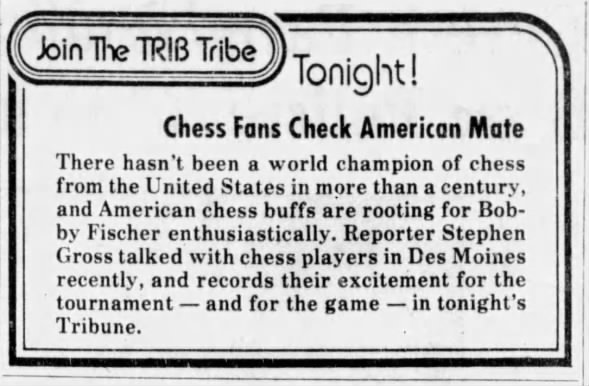 Chess Fans Check American Mate 20 Jul 1972, Thu The Des Moines Register (Des Moines, Iowa) Newspapers.com
Chess Fans Check American Mate 20 Jul 1972, Thu The Des Moines Register (Des Moines, Iowa) Newspapers.com
Pacific Daily News Agana Heights, Guam Thursday, July 20, 1972 - Page 38
U.S. Chess Champion Bobby Fischer arrives at the Icelandic hall where he meets Boris Spassky for the World Chess Championship appearing confident and wearing a smile. Spassky has the edge in the series, 2½ to 1½ over the American challenger. (UPI)
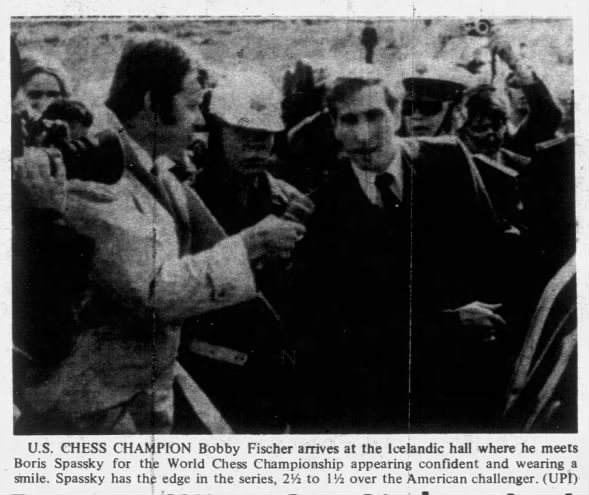 U.S. Chess Champion Bobby Fischer Arrives 20 Jul 1972, Thu Pacific Daily News (Agana Heights, Guam) Newspapers.com
U.S. Chess Champion Bobby Fischer Arrives 20 Jul 1972, Thu Pacific Daily News (Agana Heights, Guam) Newspapers.com
The Age Melbourne, Victoria, Australia Thursday, July 20, 1972 - Page 12
Fischer Recovers to Force a Draw by Michael Woodhams of the Melbourne Chess Club
American challenger, Bobby Fischer, yesterday recovered from an almost hopeless position to force a draw in the fourth game of the World Chess Championship series.
The score is now 2½ games to 1½ in favor of the Russian champion, Boris Spassky.
Spassky employed the aggressive Sicilian Defense and showed a willingness to play an attacking game. A marked contrast to his passive play in the first and third game.
The champion surprised Fischer was a new opening move, 13. … P-QR4, which sacrificed a pawn but gave him two bishops, open lines on Fischer's king and an attack which endured for 20 moves.
The challenger defended skillfully, seeking to exchange Spassky's aggressive pieces.
He succeeded at the cost of his extra pawn. And, finally, both players were left with insufficient pieces to force a win.
However, just before the exchange of the queens, Spassky missed the chance of a win. With a faulty 29th move he left Fischer escape from a weak position.
With a slight transposition of moves, Spassky could have maintained his attack.
Yesterday's moves:
1. e4 c5
2. Nf3 d6
3. d4 cxd4
4. Nxd4 Nf6
5. Nc3 Nc6
6. Bc4 e6
7. Bb3 Be7
8. Be3 O-O
9. O-O a6
10. f4 Nxd4
11. Bxd4 b5
12. a3 Bb7
13. Qd3 a5
Spassky goes on the attack, threatening P-N5 which would drive the white knight from the defense of the KP, and holds B-QR3 in reserve.
14. e5 dxe5
15. fxe5 Nd7
16. Nxb5 Nc5
17. Bxc5
This time Fischer concedes Spassky the bishop pair. The space they control, and the threats they generate, are well worth the sacrificed pawn.
17. … Bxc5+
18. Kh1 Qg5
19. Qe2 Rad8
Meeting the double threat of mate and the attack on his KP.
20. Rad1 Rxd1
21. Rxd1 h5
22. Nd6 Ba8
23. Bc4 h4
24. h3 Be3
25. Qg4 Qxe5
26. Qxh4 g5
Another fine move, intending K-N2 and R-KR1 bringing his rook into the attack.
27. Qg4 Bc5
28. Nb5 Kg7
29. Nd4 Rh8
This allows Fischer to blunt the attack by exchanging pieces.
30. Nf3 Bxf3
31. Qxf3 Bd6
32. Qc3 Qxc3
33. bxc3 Be5
34. Rd7 Kf6
35. Kg1 Bxc3
36. Be2 Be5
37. Kf1 Rc8
38. Bh5
With mate threatened, Spassky is forced to remove the rooks and, with opposite colored bishops, a draw is the only result.
38. … Rc7
39. Rxc7 Bxc7
40. a4 Ke7
41. Ke2 f5
42. Kd3 Be5
43. c4 Kd6
44. Bf7 Bg3
45. c5+ Draw agreed.
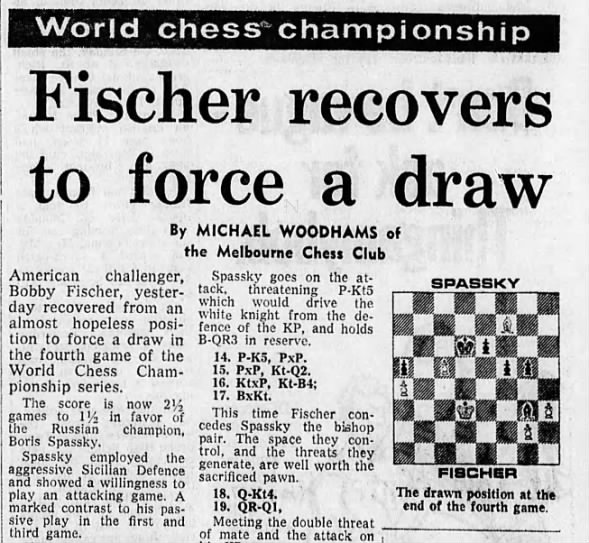 Fischer Recovers to Force a Draw 20 Jul 1972, Thu The Age (Melbourne, Victoria, Australia) Newspapers.com
Fischer Recovers to Force a Draw 20 Jul 1972, Thu The Age (Melbourne, Victoria, Australia) Newspapers.com
The Republic Columbus, Indiana Thursday, July 20, 1972 - Page 4
Letters From Republic's Readers: Check Yourself
To the Editor: I was disappointed to see The Republic print the editorial, “Fischer Checkmates Self.” Although the editorial was written by an NEA writer I assume that the editorial staff at The Republic agrees with the sentiments expressed in the editorial.
The editorial derides ([the American champion]) Fischer because of his ([projected Soviet]) personal traits and actions. ([Actions? Snubbing Australia's legal $225,000 bid and juvenile threat to not allow Spassky to compete. USSR subsidized this western journalist to say every conceivable negative thing he could invent, regardless whether it was factual or truthful.]) So you don't like Fischer as a person. Is a chess match a personality contest?
In a football game is Joe Namath's activities off the field more important to discuss than how Joe Namath is playing the position of quarterback?
Some famous composers have had despicable personalities ([or so their critics and jealous colleagues have written about them]) yet their music is played and provides enjoyment to the listeners.
([What of Soviet character flaws? Such as the scandals surrounding chemically induced enhancement for performance, even deaths under suspicious circumstances. What of Soviet anti-Semitism? Fischer and Sammy Reshevsky worshiped God on the 7th day Sabbath. Soviet subsidized journalists to distort how Fischer was given an ultimatum to either walk out while in the lead, or break the Sabbath! Fischer walked. Oh my, but that's “temperamental,” say the Antisemites, proceeding to dub Sammy the “Reshevsky problem”. Since the media is into character assassination, where's the blistering criticism of Soviet racism in these biting tabloid press reports?])
The comment that chess is a game “…shoving a bunch of toys around…” is the understatement of the century.
([Not worthy of mentioning Iceland is renown for its bitter Anti-American hostilities and tough restrictions singling out persons of the African race?? A most serious “character” flaw! Seems the media hasn't time to invest in real issues such as these, but plenty of time to malign the character of Soviet enemies. No time to encourage the home team.])
The writer could have pointed out in a respectable way, that Fischer is truly an outstanding chess player and in no way (as far as I know) sponsored by our tax dollars as opposed to Spassky who is sponsored by the USSR. —James W. Whittlesey.
Fort Worth Star-Telegram Fort Worth, Texas Thursday, July 20, 1972 - Page 5
New Quarters Sought For Fischer, Spassky
Reykjavik (Reuter) — Bobby Fischer and Boris Spassky relaxed Wednesday in their hotels in preparation for new living quarters for them.
The Russian world champion is leading 2½ points to 1½ in the series after the fourth game Tuesday night was drawn.
Icelandic officials are looking for a private villa in the city to offer Spassky for the duration of the match, which could last another two months.
They say he is fed up with hotel life. He was offered a house at Garda, six miles outside Reykjavik, but decided it was too far away.
THE PRESIDENT of the Icelandic Chess Federation, Gudmundur Thorarinsson, visited Spassky's chief administrative aide, grandmaster Nikolai Krogius, to discuss the world champion's accommodation.
Across the capital, the American challenger was sleeping. Fischer is a “night owl” who appears in public only when going to and from a game, on short sprints to his hotel swimming pool or at the bowling alleys at the nearby U.S. military base.
Alternative accommodations also are being sought for Fischer, American officials have inspected one house and given the challenger a favorable report about it, but they are keeping the location secret.
Fischer's administrative assistant, Fred Kramer, a vice president of the World Chess Federation, told reporters that before going bowling Tuesday night the challenger spent considerable time analyzing the drawn game.
Most experts here say Spassky showed that he was not properly informed by allowing Fischer to slip out of a very nasty situation when he should have won.
THIS IS NOT exactly how Kramer sees it. He said that game was evidently put together in Moscow by Spassky's grandmasters.
“Spassky raced through the first part of the game but Bobby knew how to handle it … as he always will. He was never in serious trouble.”
Kramer added that the question of allowing television cameras into the hall was being decided in New York by Fischer's lawyers and the American Broadcasting Co.
([Note the Soviet Propaganda alluded to: “Most experts here say Spassky… was not properly informed by allowing Fischer to slip out… when he should have won.” Oh! “Blame Spassky! Blame Spassky!…” and they did. Spassky was punished by the Soviet for loss of the crown and blamed, while the Soviet, out of its unbridled stubbornness refused to acknowledge Fischer was a superior gamesman who has more than sufficient skill to tackle whatever moves the Soviet may throw at him.])
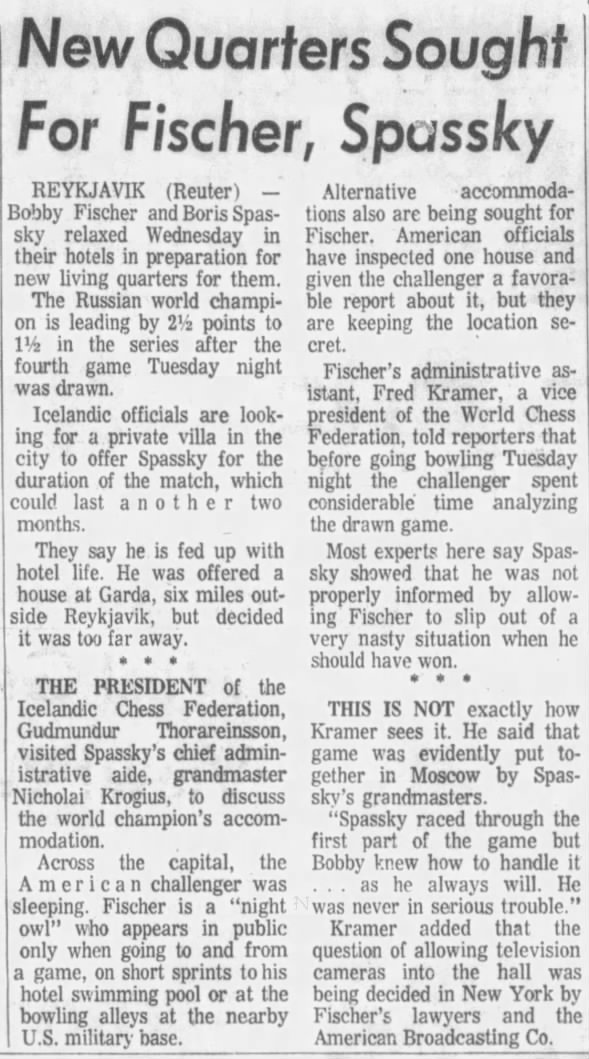 New Quarters Sought For Fischer, Spassky 20 Jul 1972, Thu Fort Worth Star-Telegram (Fort Worth, Texas) Newspapers.com
New Quarters Sought For Fischer, Spassky 20 Jul 1972, Thu Fort Worth Star-Telegram (Fort Worth, Texas) Newspapers.com
Pants On Fire: Fischer Already Had The Authority To Remove The Cameras
So emboldened are the Soviets they here do boastfully declare their rule-breaking shoddy treatment they're doling out upon the U.S. challenger. Assuming Americans are too slow for the many contradictions to sink in. “Fischer's Demands Rejected” presumably this further admission of tormenting Fischer is to elicit standing ovations and cheers from Americans for those righteous Soviets cheating and misleading the public lie by gradual lie! “Although many of Fischer's demands were trivial — he also asked for “written authority to have film cameras removed from the playing hall” if they disturbed him.
FISCHER ALREADY HAD THAT AUTHORITY! SO WHY SHOULD HE BE ASKING FOR IT AS IF HE NEEDED SOVIET PERMISSION?!
“Colonel Edmondson said that under the rules of a world championship tournament, Fischer had a right to demand the removal of the cameras and to refuse to play if they were not removed. — New York Times, Thursday, July 20, 1972 … but the Soviet USSR will lose this championship so their allies are packing western newspapers full of biased Anti-American irrelevancies and nonsense to blindside Americans with such brazen Soviet Propaganda tactics, that's staring them in the face from their morning newspaper!
To Protest... Or Not To Protest?
Fischer “Demands” Threaten Match? … Fischer Not Protesting This Time.
How can it be both?
They lied already, claiming Fischer sought authority to demand removal of cameras, when he ALREADY possessed that right.
Oh, now he’s “demanding” new living arrangements?
But another journalist already confirmed new living quarters were being sought for both Fischer and Spassky.
How the quarrelsome Soviets do use every trick in the book, twist facts inside and out to paint Fischer in a bad light before his fellow Americans and pull his support base out from under him!
Wisconsin State Journal Madison, Wisconsin Thursday, July 20, 1972 - Page 6
No Wonder Soviet 'Chess Machine' Wins
Sirs — I was disappointed to see The Wisconsin State Journal endorse Russian Boris Spassky in the current chess championship. ([And no doubt endorses the Soviet Empire, altogether in other matters.])
The USSR takes chess very seriously and spends a great deal of money and effort to insure that a Soviet player is always the world champion. By training children and providing state support for promising players, the Soviet “chess machine” has completely dominated the game since 1948.
Indeed, no one but a Soviet citizen has even been able to enter into a world championship game in recent history.
Spassky goes into the contest with two international grand masters to help him with game analysis plus a psychologist to analyze his opponent! Quite a team.
Bobby Fischer is going it alone. He is a bit ([Fischer was dubbed many things by his detractors because Fischer often made the same demands the Soviets are guilty of making themselves but Soviet allies in western media just didn't care to emphasize on Soviet misbehavior. Such as whining about the conditions of the auditorium provided by the host of the Vancouver match between Taimanov and Fischer? The Soviets threw their most unappreciative, juvenile tantrums, threatening to forbid Spassky travel and compete in Canada's future tournaments when they didn't immediately get their demands met]), and he is concerned about money — ([so are the Soviets, trying to whittle the prize down to barest minimal]) — he does not have a government to subsidize him. And it seems that he does not even have the support of the press in his native land. ([Soviet subsidize western journalists, as Soviet subsidize chess champions who bring home gold to prop up the party lies about Soviet Imperial Supremacy])
A lone individual vs. the world's mightiest team. You have made your choice, but I am for Bobby Fischer. — James E. Blair, 2210 Ravenswood Rd., Madison, Wisconsin.
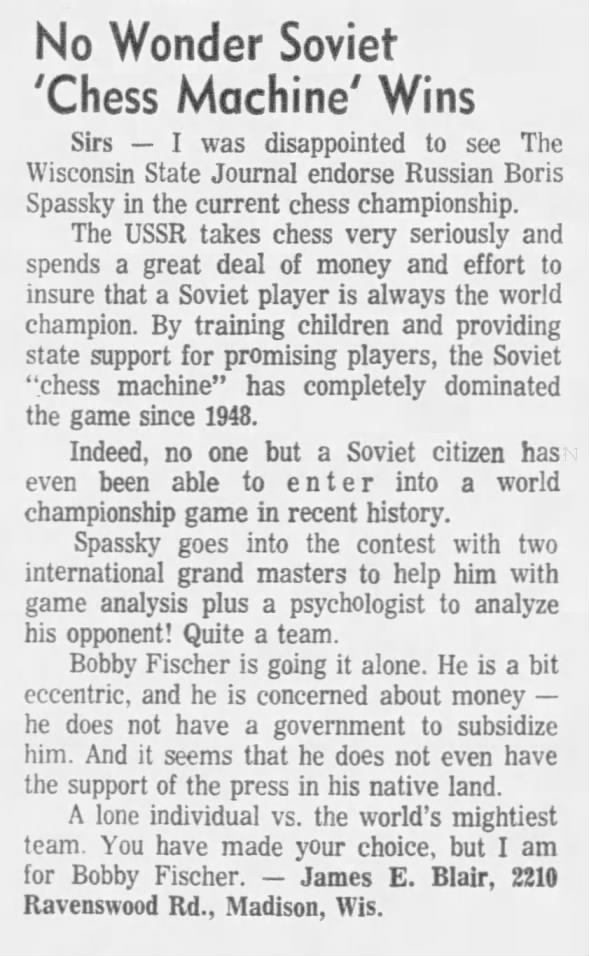 No Wonder Soviet 'Chess Machine' Wins 20 Jul 1972, Thu Wisconsin State Journal (Madison, Wisconsin) Newspapers.com
No Wonder Soviet 'Chess Machine' Wins 20 Jul 1972, Thu Wisconsin State Journal (Madison, Wisconsin) Newspapers.com
Centre Daily Times State College, Pennsylvania Thursday, July 20, 1972 - Page 16
Byrne Still Expects Fischer Victory by Joan A. Kurilla, Times Staff Writer
Donald Byrne, the University's chess coach, still hopes to see a new American World Champion, but has some reservations as to whether the current match will ever be completed.
One of the 10 best chess players in the nation, Mr. Byrne says U.S. challenger Bobby Fischer is better at the game than the world champion Boris Spassky of the Soviet Union.
“I'm quite convinced that even with the disadvantage of two points down at the onset ([which were manipulated by the Soviet exploiting technicalities over disruptive men operating cameras, then flooding the press with misleading information claiming these were “closed circuit” cameras; automatic, stationary but nothing could be farther from the truth]), Bobby can win the match, but I'm not at all sure the match will be completed,” Mr. Byrne said.
Fischer boycotted the second game because cameras had not been removed. ([And, as the U.S. Chess Federation executives informed Americans, but the national media refused to syndicate the actual facts, internationally: “Colonel Edmondson said that under the rules of a world championship tournament, Fischer had a right to demand the removal of the cameras and to refuse to play if they were not removed.” - New York Times, July 20, 1972.]) No filming was permitted for the third and fourth games.
As trivial as such requests sound, they are probably justified, according to Mr. Byrne. Having played against the U.S. champion six times, Mr. Byrne said that cameras have always bothered him even though they may not be obvious. ([But they were obvious, Mr. Byrne. Says Robert J. Fischer: “…they had these characters there, who instead of having, some kind of video tape film that didn't make any noise, just, nobody around to operate them, just sort of stationary and they just had guys there with film cameras that were worrying, and they were all around me. Making a racket. A nuisance. Too much noise, and visually you could see them moving around.”])
“Just knowing that the cameras are there—even knowing that a person is drawing his portrait—bothers him,” Mr. Byrne said.
On the request for exclusive swimming rights, Mr. Byrne said that Fischer “probably has gotten tired of bunches of newsmen jumping in the pool after him, and would just like to swim.”
One of the newsmen covering the tournament is Robert Byrne, the Penn State coach's brother. Also a U.S. grandmaster in chess, Robert is writing for the New York Daily News.
Mr. Byrne expected some difficulty at first, but believed that the match would be well under way by now.
“Bobby often makes many demands in the beginning, and most of them are justified. Then once they are met, he settles down to playing,” he said.
 Byrne Still Expects Fischer Victory 20 Jul 1972, Thu Centre Daily Times (State College, Pennsylvania) Newspapers.com
Byrne Still Expects Fischer Victory 20 Jul 1972, Thu Centre Daily Times (State College, Pennsylvania) Newspapers.com
The Maryville Daily Forum Maryville, Missouri Thursday, July 20, 1972 - Page 8
Chess Enthusiasm: Elmo Wright and Aaron Brown of the Kansas City Chiefs by Steve Cameron
Liberty — He's not quite ready to take on Boris Spassky, but Elmo Wright is a chess freak.
Wright, the Kansas City Chiefs' second-year wide receiver, took up the game just three years ago, but he packs a portable chess set with magnetized pieces and will play in his room, on airplanes and anywhere else he can find an opponent.
Elmo's consistent rival is defensive end Aaron Brown, who is the Chiefs' unofficial champion. So while Russia's Spassky and American Bobby Fischer contest the world championship of chess, Wright and Brown are having their own duel at training camp.
Besides the caliber of play, Wright jokingly sees another difference in the two matchups. “It's a lot cooler in Iceland,” he says.
Wright and Brown are just two of a host of Chiefs who have jumped into chess with a passion. The silence on board the team plane en route to a road game can be startling as matches are played out up and down the aisle.
Wright, a former academic All-American who is a handful of credits away from a degree in electrical engineering from the University of Houston, sees nothing unusual in football players being avid chess fans. The correlation between football and chess, and the thinking required to be successful at either, is not lost on him.
“The most important thing about chess is concentration,” he says. “Football is the same way. Usually football games aren't won by one team. They're lost by the other team because of a momentary drop in concentration. A good chess player is one who can stay at a peak of concentration all through the game. The two games are quite similar as the mental process required of a player.”
Elmo found out a lot about the mental side of pro football when he joined the Chiefs in 1971 after a brilliant, All-American career at Houston.
“The overall difference was the first thing that struck me,” he says, “In college you don't spend that much time thinking football. When I got to Kansas City I realized I had to think about the game all the time. It's a job, and to be a good professional you have to think of every possible thing you might have to do.”
On the field, the mental pressure was just as tough. “There are a lot more things to concentrate on than in college,” Wright says. “You have to know each assignment perfectly. You have to think about the defenses, the quarterback, the game situation — rookie receivers make a lot of mistakes because of the amount of concentration required.”
Elmo made some mistakes in his first year, but the greatness predicted for him was shining through unmistakably as the season progressed. He made number of spectacular clutch catches and delighted Kansas City fans with an end zone victory dance after his three touchdown receptions.
Overall, Wright snagged 26 passes for 524 years, a very creditable 20.2 yards per catch.
“I wasn't displeased with my rookie year,” he says after a bit of thought. “I would like to have caught more passes but it's stupid to set a goal you can't reach. I mean, I could tell you today that I want to catch 80 balls this year. But I won't because we have a great receiver named Otis Taylor on the other side of the field and I won't have enough passes thrown to me to catch 80.
“The way to judge a receiver isn't by how many passes he catches, but by how many he catches of the ones that are thrown to him and what he does with them after he catches them.”
However many balls Elmo grabbed in '71, his effect on the Chiefs' passing game was obvious. Taylor caught 57 for 1,110 yards and, asked for the key to his fabulous year, says simply: “Len Dawson—and Elmo Wright.”
Otis' reasoning is that with Wright darting around loose, a defensive secondary could rarely afford to double-team him, a luxury he had rarely enjoyed in the past.
With the Chiefs flaunting two excellent wide receivers, Elmo Wright's game has thus become like chess in another way. He's only having to battle one opponent at a time. That almost guarantees that some NFL defensive backs will find themselves checkmated in 1972.
With the Soviet succeeding to bury the match, by isolating the tournament in the very Anti-American, Racist Iceland, the Soviet has monopolized the ability to control the narrative coming out of Reykjavik and has basically, smeared Robert Fischer's desire for the tournament to be properly filmed, in his face.
Instead of silent, automatic closed-circuit cameras, the Icelandic-Soviet chess officials have proceeded to bombard the auditorium with disruptive crews of men operating large, bulky cameras, intent on disrupting Fischer's concentration. Of course, news reports back in America tell a different story, of “hidden” cameras that can neither be seen nor heard. A result of the match being isolated and news channels to the world cut off, while the Soviet can now bury their humiliating defeat before it ever reached the world's eye.
The Soviet-influenced press is bombarding world newspapers with false reports as if Fischer is simply “wishy-washy” and bound to change his mind any day about these large, bulky, disruptive crews of camera men… and daily, rehashing and repeating the same rubbish about meetings and negotiations and even false reports that cameras will be permitted into the auditorium. One story says yes, another says no. When the Soviet rumor mill stories about filming do not come to fruition, the Soviet press then, further uses it as another opportunity to bash Fischer's reputation some more, as if Fischer once again, “changed his mind at the last minute.”
“…But Fischer's personal representative, Fred Cramer, said the 29-year-old American challenger “has not changed his mind” about his objections.
Fischer claims the ([disruptive men operating large, bulky television]) cameras disturb his concentration.”
-The Lexington Herald Lexington, Kentucky Thursday, July 20, 1972
And furthermore, “Colonel Edmondson said that under the rules of a world championship tournament, Fischer had a right to demand the removal of the cameras and to refuse to play if they were not removed.” - The New York Times, July 20, 1972
Fischer isn't half as “unpredictable” as the quarrelsome Soviet has tried to make out. It really couldn't be more clear or that difficult to understand.
The Charlotte Observer Charlotte, North Carolina Thursday, July 20, 1972 - Page 16
Thanks For Chess Coverage
Thank you so much for the excellent coverage of the world championship chess match. The Observer's circulation area has many chess enthusiasts, from duffers like me to experts, and we are all ecstatic about being able to play the games the next day. It's the next best thing to being there. — Frances W. Brown, Charlotte.
The Leader-Post Regina, Saskatchewan, Canada Thursday, July 20, 1972 - Page 11
Professional Ethics in Journalism
“We do not take issue with the right of any individual in the working press to adopt whatever private political sympathies he chooses—as a private, individual citizen,” the statement said.
“However, that right does not extend to the public exhibition of those views by groups or persons who have chosen as a profession the unbiased communication of ideas and events.”
([Then why did professional ethics in journalism escape the handful of persons selected by the Soviet Union to cover the games in Reykjavik, Iceland? Too many examples of what amounts as nothing more than idle rumors cited as “fact,” and no effort to clarify to the contrary, that the report was biased, and not based on any measurable investigation. Failure to relay accurate accounts, such as blatant omission of important dynamics, particularly, that Iceland was notoriously ANTI-AMERICAN and vehemently racist, accounting for why Fischer's mentor and friend Archie Waters reports being the ONLY African American he was aware of, present in or anywhere near the Sports hall. Press reports are plagued with contradictions between competing press agencies, contorted details amounting to nothing more than vicious gossip about the lone rival of Soviet Imperialist machinery. Such politically-biased distortions as these, demonstrate those individuals were unworthy to be classed among their colleagues in “professional journalism”. They did a great disservice to the profession as well as the public they were employed to serve. When it came to reporting FACTS about Robert J. Fischer, and the tournament itself, the outcome amounted to nothing short of libelous defamation and along with it, made a great mockery of a once noble game.])
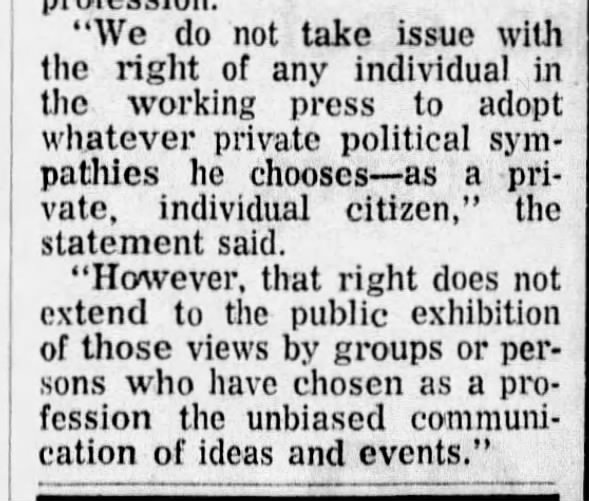 20 Jul 1972, Thu The Leader-Post (Regina, Saskatchewan, Canada) Newspapers.com
20 Jul 1972, Thu The Leader-Post (Regina, Saskatchewan, Canada) Newspapers.com
The Holland Evening Sentinel Holland, Michigan Thursday, July 20, 1972 - Page 1
Chess Fans in Moscow
Soviet chess master Yuri Katkov discusses moves from the fourth game of the Boris Spassky-Bobby Fischer championship series with fans at the Moscow Chess Club. The fifth game got under way today after some difficulties concerning televising of the match in Iceland. UPI Telephoto
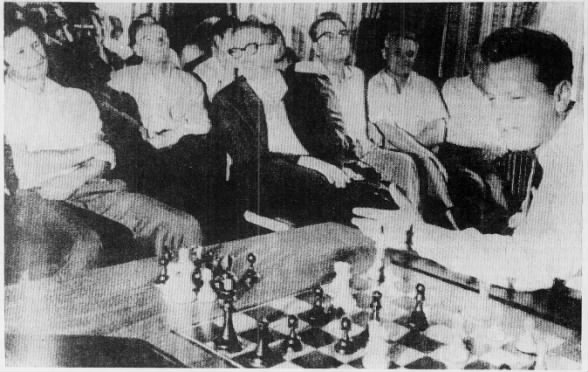 Soviet Chess Master Discusses Moves 30 Jul 1972, Sun Battle Creek Enquirer (Battle Creek, Michigan) Newspapers.com
Soviet Chess Master Discusses Moves 30 Jul 1972, Sun Battle Creek Enquirer (Battle Creek, Michigan) Newspapers.com
The Leader-Post Regina, Saskatchewan, Canada Thursday, July 20, 1972 - Page 11
World Chess Moves
Reykjavik, Iceland (AP)—The moves in the fourth game of the world chess championship between defending champion Boris Spassky and Bobby Fischer.













